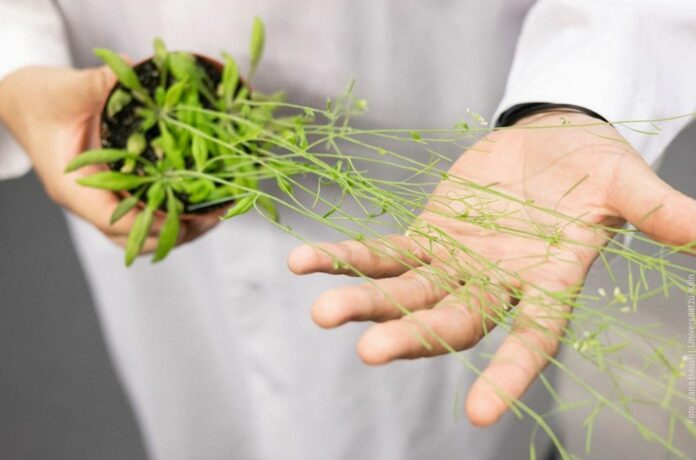A new study reveals an unconventional approach to finding potential drugs to treat human neurodegenerative diseases, also known as polyglutamine (polyQ) diseases.
It can reduce the clumping of proteins responsible for human neurodegenerative diseases.
Scientists have found a promising synthetic plant biology approach for the development of a therapy to treat neurodegenerative disorders in humans, especially Huntington’s disease.
Scientists from the University of Cologne’s CECAD Cluster of Excellence for Aging Research and the CEPLAS Cluster of Excellence for Plant Sciences have uncovered an innovative plant-based strategy that holds promise for treating human neurodegenerative conditions, notably Huntington’s disease. In their recent article titled “Examining In-plant Expression of Human PolyQ-expanded Huntingtin Fragment to Understand Disease-Related Protein Aggregation Mechanisms” in Nature Aging, the team highlighted the potential of a plant-sourced synthetic enzyme, stromal processing peptidase (SPP), in mitigating protein clumping, a hallmark of Huntington’s disease, both in human cells and the worm species Caenorhabditis elegans.
Huntington’s disease is categorized under polyglutamine (polyQ) diseases, which are a set of neurodegenerative conditions triggered by an over-repetition of glutamine amino acids in certain proteins. An unusually high number of these polyQ repetitions can lead to damaging protein clumps, culminating in cell malfunction and demise. Currently, there are nine known polyQ conditions in humans, all of which lack a cure. Among these, Huntington’s disease stands out as a hereditary ailment causing severe brain degeneration and impacting cognitive processes, emotions, and physical movements.
Plants show a unique resistance to damaging protein clusters
In their news research, Professor Dr. David Vilchez of CECAD and Dr. Ernesto Llamas from CEPLAS took a novel route to identify potential treatments for polyQ diseases like Huntington’s.
Plants, despite being consistently exposed to varying environmental challenges and unable to relocate, demonstrate incredible resilience and longevity. Unlike humans, who face conditions caused by toxic protein clusters, plants remain unaffected by such ailments. Even though they produce hundreds of proteins with polyQ repetitions, no related diseases have been observed. To delve deeper into this phenomenon, Dr. Ernesto Llamas and his team introduced the damaging mutant protein, huntingtin, which induces cell death in human neurons, into plants. Remarkably, when tested in Arabidopsis thaliana plants, these organisms managed to break down the huntingtin protein aggregations, preventing potential harm.
Leveraging synthetic biology, the research team then translated this unique trait from plants to human cell cultures and animal Huntington’s disease models. They believe that harnessing the power of plant proteins might pave the way for innovative treatment strategies for Huntington’s and other similar neurodegenerative conditions.
“We were surprised to see plants completely healthy, even though they were genetically producing the toxic human protein. The expression of mutant huntingtin in other models of research like human cultured cells, mice and nematode worms induce detrimental effects and symptoms of disease,” commented David Vilchez.
How Plant Proteins Might Tackle Human Diseases
The researchers sought to unravel the mystery of plants’ resistance to the toxic accumulation of mutant huntingtin. Remarkably, they found that chloroplasts, the plant cells responsible for photosynthesis, were key in this process.
Llamas commented, “Unlike humans, plants have chloroplasts, an extra cellular type of organelle that could provide an expanded molecular machinery to get rid of toxic protein aggregates.”
The team pinpointed the plant-specific protein, SPP, in chloroplasts as the protective shield against the detrimental human protein. When they introduced this plant protein into models of Huntington’s disease, namely human cell cultures and the worm C. elegans, there was a marked reduction in protein aggregation and disease symptoms.
Dr. Hyun Ju Lee, a postdoctoral researcher in the team, noted, “We were pleased to observe that expression of the plant SPP protein improved motility of C. elegans worms affected by huntingtin even at later aging stages where the symptoms are even worse.”
These findings highlight the potential of SPP as a therapeutic solution for Huntington’s disease.
The Power of Plants in Aging and Disease Research
Llamas is of the belief that studying plants could revolutionize the treatment of human diseases.
“Many people don’t notice that plants can persist amongst variable and extreme environmental conditions that cause protein aggregation. I believe that plant molecular mechanisms hold the key to discovering new drugs that can prevent human diseases. We usually forget that some plants can live thousands of years and should be studied as models of aging research.”
Dr. Seda Koyuncu, another contributor to the research, added, “Over the past years, we have seen several promising approaches to treating hereditary diseases like Huntington’s fail. We are confident that our plant synthetic approach will lead to significant advances in the field.”
Fueled by a grant from the German Federal Ministry of Education and Research (Bundesministerium für Bildung und Forschung – BMBF) under the GO-Bio initiative, the team is ready to take their discovery to the next level.
Llamas added, “We want to bring our idea into an application. Our plan is to found a start-up to produce plant-derived therapeutic proteins and to test them as potential therapeutics to treat neurodegenerative diseases in humans.”
Source: 10.1038/s43587-023-00502-1
Image Credit: JANA BAUCH, UNIVERSITY OF COLOGNE
